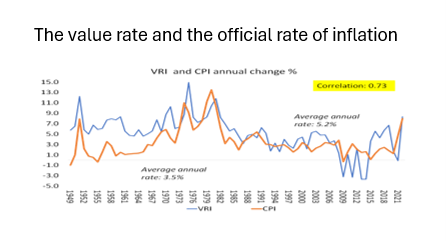
My presentation was based on joint work with Guglielmo Carchedi on the underlying causes of inflation. We argue that the mainstream monetarist, Keynesian cost push and the psychological ‘expectations’ theories are false. Instead, we offer a value theory of inflation. This argues that, as in Marxist theory aggregate values equal prices of production and money is a representation of that value, so ceteris paribus,if value grows, money supply will rise to match that value growth and so there will be no inflation in prices. However, new value growth (which we measure in hours of labour worked by the whole labour force in an economy) tends to slow relative to increased output of commodities. So prices per unit of output should tend to fall as less labour time is involved in the production of output.
Seems very confusingly explained part in bold, would be easier to say that for equal m2 the prices should drop, because its very far reaching statement otherwise


